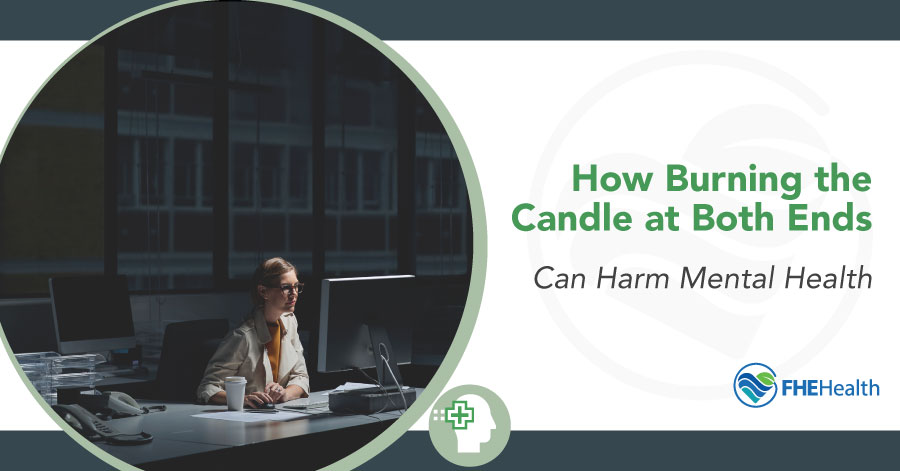
In today’s society, being busy is sometimes a hallmark of success. People tend to think that if they stay as busy as they can, they’ll be viewed as being a person who’s successful and who has things going for them. What those individuals might not realize is that being too busy and never planning time to rest and recharge can lead to mental health issues and burnout, as well as medical problems.
Susan is an executive who always has a full schedule. From the minute she wakes up until she goes to bed, she’s on the go. She doesn’t realize that her lifestyle is starting to take its toll on her. She’s feeling more tired than usual but promises herself she’ll rest soon. She just has to make it through what she already has planned and then she’ll take a long-overdue day off.
Unfortunately, she never makes it to that point. Her schedule is so full that she can’t take a day off, until one day, her body forces her to. She starts having chest pains and has to go to the hospital, where she learns she’s having a heart attack. As she sits in her hospital bed in the days after that experience, Susan realizes that she wasn’t doing herself any favors by working so hard and staying so busy. She decides to turn to professionals for help.
What Are the Risks of Burnout?
There are many risks of staying so busy that you can’t find time to relax. Researchers at University College London reviewed the correlation between heart attacks and working hours. The study found that individuals who worked long hours were more likely to have a heart attack than those who didn’t. These risks are the most pronounced in individuals who are in a lower socioeconomic group from higher wage earners.
They adjusted the data for factors like physical activity, drinking alcohol and smoking. They also compensated for things like high cholesterol, high blood pressure and diabetes. What they found was that there was a 33% increased risk of stroke and a 13% increased risk of a heart attack in people who worked 55 hours per week than in those who worked 35 to 40 hours per week.
On top of those physical health factors, you’re also a risk of some mental health problems. Typically, working too much leads to stress. There’s also a chance that you’ll stop working out and start eating unhealthy foods. All of this can wear on your mental health, and you may start to experience problems like depression or anxiety.
It’s often easy to miss the signs that you need to take a break. Some people will continue to suppress the feelings that they’re overworking themselves until their body makes it perfectly clear that they need to take a break. Whether you’re facing a physical health ailment or a mental health issue, it’s imperative that you take the time you need to heal without trying to continue working an unrealistic schedule.
How Can You Minimize the Risk of Too Much Stress?
It’s often difficult to stop overscheduling yourself once you become accustomed to having a busy schedule. One of the first things you have to do is to schedule time for yourself. Most people say they will “pencil in” an event. You can’t do this with time for yourself. It can’t be something you change because something else comes up.
You need to learn methods that can help you control your stressors. This might be through meditation or a similar method. Some people turn to yoga to help with stress. Reading books or watching movies might also help you. Your mental health team can help you find ways to reduce your stress.
You also need to take a look at your diet. Eating healthier foods can help you feel your best as well as giving your body what it needs to function properly. This can reduce your chance of suffering from negative health impacts like stroke, heart attack, diabetes and other similar conditions. Writing out your meals for the day, week, or month might help you stay on track with this part of your new reduced stress lifestyle.
Increasing your physical activity is another way you can minimize the risks associated with staying too busy. When you increase your physical activity, you might find that your mental health stress decreases. This is because your body can produce the hormones that come with exercise that can help to improve your mental health.
Getting active doesn’t mean you have to be ready to run marathons. You can find options that you enjoy. Walking, swimming, biking, dancing and playing basketball are some examples. Many people find that varying their activities helps them stay motivated to continue physical activity.
Having a good support system is also beneficial. Try to find people you can count on to remind you that you need to take time for yourself. These might be individuals who are willing to exercise with you or who will partake in fun activities with you.
Contact FHE Health for Help Dealing with Stress and Other Factors
When your stress or other factors become overwhelming, you need to turn to experts to help you get control of your mental health. FHE Health is here to answer your call 24/7. Call us at 844-994-1795 to speak to one of our experienced professionals. We’ll help you discover how we can help you take control of your life again by not neglecting mental health and finding healthy ways to avoid mental exhaustion.






